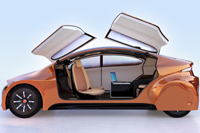Research objectives
- Explore the nexus of travel demand, energy use, air quality and carbon emissions at the individual, household, city and national levels;
- Examine the emergence and development of innovations that are expected to reduce energy demand and carbon emissions in passenger and freight transport;
- Understand how transport systems and practices can be made more resilient to climate change;
- Explore different long-term futures for low-carbon and resilient transport systems;
- Develop and apply multi-scale decision support systems and modelling tools;
- Make a practical contribution to policy making in the transport, climate, air quality and energy domains.
Current research projects
Recent research projects
Advances in vehicle connectivity and autonomy have increased speculation around the future of the car. Dominated by techno-economic views, these debates currently tend to overemphasise the scale, speed and benefits of a shift to connected and autonomous vehicles (CAVs). 'Non-technical' factors (e.g., costs, regulatory frameworks, public acceptance) are typically seen as presenting the main barriers to deployment. Such accounts fail to recognise how cultural, institutional and everyday practices will shape CAV developments.

The purpose of this project is to develop an alternative path to electric vehicle ownership and use for households without sufficient or appropriate parking to charge electric vehicles from their homes. Park and Charge (PnC) aims to deliver a new technological and business model design via an easy-to-use, car-park-based service.

Automated vehicles (AVs) could represent the most profound technological change in road transport since the rise of mass production, with reductions in energy demand being one of the many anticipated benefits. Expectations about the effects of AVs on transport systems, including their impacts on energy demand and greenhouse gas (GHG) emissions, are currently soaring. However, there is considerable uncertainty because 1) AV technology is developing rapidly and needs to be embedded in existing mobility systems, 2) automobility is also in flux for factors beyond automation, and 3) AV adoption is in its infancy.

The energy storage capacity of electric vehicles (EVs) presents new opportunities and value propositions for vehicle-to-grid (V2G) power system services. Potential benefits could include the alleviation of the need for generation and transmission investments and increases in network efficiency and energy security. These benefits arise as V2G technologies enable EVs to deliver electricity from their batteries back into the smart grid which can then be used to power homes and businesses.






